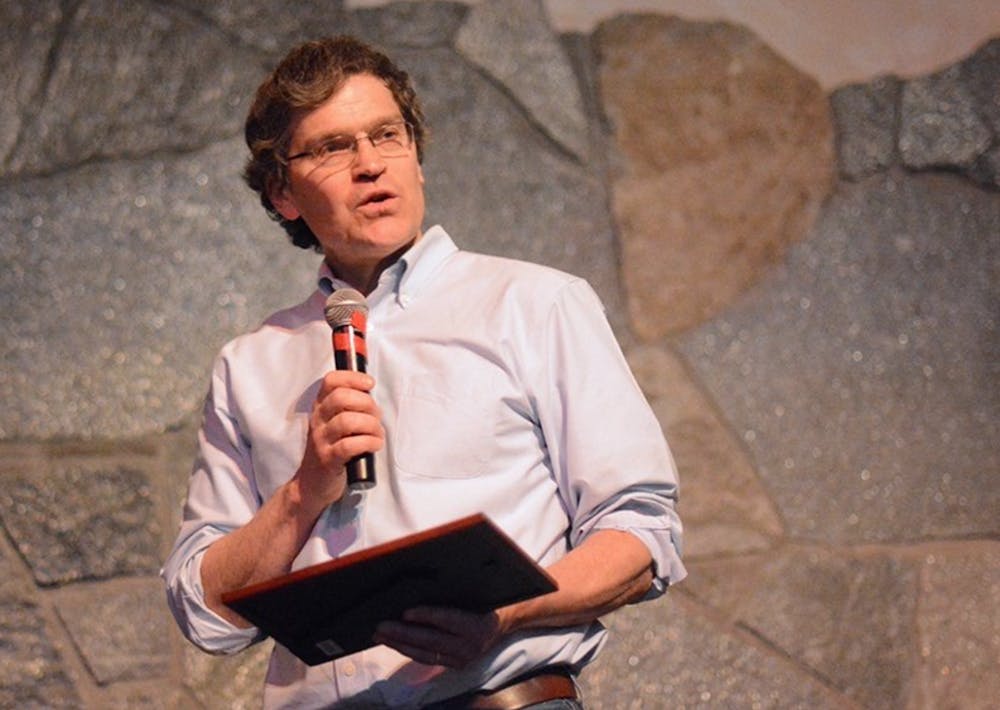Every two years, millions of politically concerned Americans huddle around televisions, cell phones and radios, patiently awaiting the results of midterm or presidential elections. It’s a process that ends in celebration for some, tears for others and confusion for many. For members of the Middlebury community, this year’s elections mean many things. Some people are creating new traditions: voting for the first time, spending their first election overseas or finding new ways to celebrate because of sore memories associated with old rituals. Others are taking part in older traditions that have stood the tests of the Covid-19 pandemic and political turmoil.
Norah Santoni de Castro ’26 is a first-time voter in this election. Santoni de Castro was born in Miami and grew up in the Dominican Republic. Despite living abroad, she has always followed U.S. politics closely and has looked forward to voting this year. At home, Santoni de Castro’s election night ritual was to watch the results come in with her family, while calling friends in the U.S. This year, the roles are reversed. She expects to be watching the results with friends in the U.S. with her family on the phone.
“It honestly doesn’t feel as different, because I’ll still just be watching the news, but it does feel a little bit more ‘real.’ This time around the choices are directly impacting me, as I’m living in the States right now, and it’s not just happening in another country,” Santoni de Castro said.
Lea Hohenlohe ’24 is currently studying abroad in Madrid. Hohenlohe is a double major in political science and philosophy, and last year she was president of College Democrats. Naturally, she considers herself an avid election follower. Yet in Spain, under Middlebury’s language pledge, she hasn’t been able to listen to news spoken in English and is thus finding it more difficult to keep up with the election. She has also found that Americans abroad aren’t as interested in talking about the election, and she doesn’t get the sense that many of her American peers plan to vote via absentee ballot. Despite being thousands of miles away and six hours ahead of Eastern Standard Time, Hohenlohe still plans to take part in her favorite election night ritual, clicking through The New York Times graphics that project likely winners in each state.
Bill McKibben, author, activist and Schumann Distinguished Scholar in Environmental Studies at Middlebury, spends much of his time advocating for climate policy on a national and international scale. As a result, elections carry significant weight for him personally and for his cause. Despite the frequent travel demanded by his role, McKibben’s election night tradition remained fairly consistent until recent years.
“When our daughter Sophie was smaller, she would draw a big map of the U.S. and then fill in the states red or blue as results came in. It was good fun, until 2016, when it was so unbearably sad that the party broke up in tears and everyone went home. Not sure we'll ever do it quite like that again,” McKibben said.
In spite of shifting politics and Covid-19 levels, some have managed to maintain steady traditions over the past several elections. Matt Dickinson is a political science professor specializing in elections and the presidency. Each election night, Dickinson and fellow political science professor Bert Johnson co-host a viewing event in Crossroads Café, where students and community members are welcome to congregate and watch as election results flow in.
Yet Dickinson has many other roles on election night. In addition to his duties as professor and election night co-host, Dickinson typically appears on local television to offer commentary and punditry, while also updating his Twitter and blog. Logistically, this routine is slightly complicated. Dickinson described how his student research assistant sits next to him onstage and keeps track of returns as they come in, while he does on-the-spot analysis.
This year, he has been requested to appear on local news stations on election night, which means he may have to miss the Crossroads viewing party, or be recorded from Crossroads and appear on television every half hour. “As long as I’m not plied with alcohol,” Dickinson joked.
Considered by many to be overproduced and at times theatrical, election night may actually play a role in strengthening our democracy. Gathering in community is proven to increase civic engagement. Celebrating election night with others may also play a role in holding election officials accountable. Dickinson reflected on election night as a reminder of the ways in which power still rests with the people. “I think getting together as a reminder of that is an important ritual that does promote this sense of civic virtue,” Dickinson said.
Editor’s Note: Maggie Bryan is the current co-president of the College Democrats.

Maggie Bryan '25 (she/her) is the Senior News Editor.
Maggie is a senior at Middlebury, majoring in Environmental Policy and French. She previously held roles as Senior Arts and Culture Editor, Arts and Culture Editor, and Staff. During her free time, she loves running, listening to live music, drinking coffee, and teaching spin classes. She is from Chapel Hill, North Carolina.




